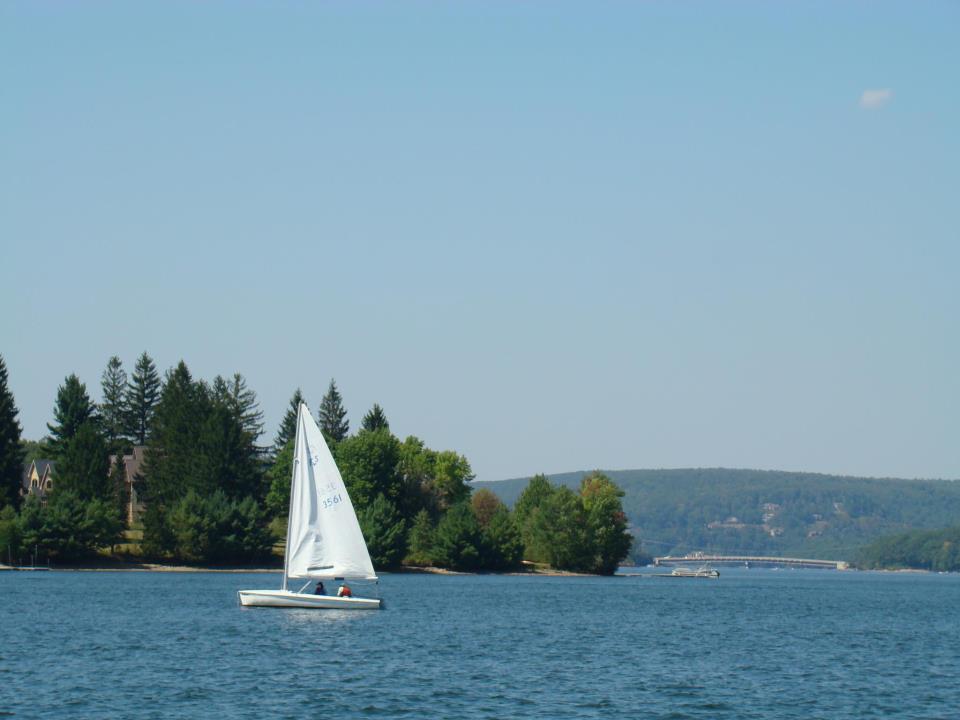Laura K.O. Smith ’05: Sailing to the End of the World and Back
The life of a full-time adventurer on the high seas
In high school, most people have posters of bands in their room, but Laura K.O. Smith ’05’s tastes hewed more anachronistic: “I laid out my desk like I thought a ship captain’s desk would look from the late 1700s.”
Growing up, Smith was enthralled by young-adult adventure novels, particularly The True Confessions of Charlotte Doyle, the story of a 19th-century teenager thrust on a harrowing sea voyage.
Continuing her lifelong romance with the ocean, Smith and her husband, Federico Guerrero, run Quixote Expeditions, a 2-year-old business that sails approximately nine hardy tourists from Chile’s Cape Horn across the perilous Drake Passage and on to the icy monoliths of Antarctica.
“A lot of people think we’re crazy,” Smith says. “It’s sort of become a new normal for us.”
The couple’s boat, the Ocean Tramp, is a double-masted rig that measures roughly 65 feet long. The pair, who met while working for an oil-services company, bought the boat after its previous owner, legendary American mountaineer Charlie Porter, died in 2014.
Ocean Tramp’s inboard engine helps to escape wayward ice, while an aluminum-fortified hull adds to its defenses. Smith and Guerrero got the idea for their business after traveling with friends to Antarctica in 2013.
As the expedition leader, Smith charts all tourist activities during the short Antarctic sailing season — December through March. Guerrero, a licensed captain, pilots the craft.
The couple made two trips last season but plan six sojourns this year. While the trips are billed as pleasure cruises, the couple give a free berth to a scientist, in most cases a biologist, whose research brings an educational component to the expedition.
Previously, passengers have helped scientists collect water samples and log bird and mammal sightings; a forthcoming trip will include a researcher who studies whether whales can smell.
Trips last 25 days, two weeks of which are spent getting to and from the Antarctic Peninsula. All hands help with the sails, chop potatoes, and wash dishes.
The continent beguiles in a number of ways, Smith says, noting in particular the region’s monochromatic splendor.
“Antarctica [has an] interesting lack of color,” she says. “You essentially have blue, white, and shades of gray — [it’s]almost completely devoid of reds and greens and yellows.
“And there’s something about the icebergs — [it’s] sort of like watching clouds,” she adds. “They’re all different shapes, and it never grows old.”
Smith’s life on the water dates to her childhood, when she took part in summer sailing camps guiding dinghies across Maryland’s Deep Creek Lake.
After majoring in geological engineering at Princeton, she worked for Schlumberger, looking for crude in the waters off nations such as India, Norway, Qatar, and Angola.
Now, Quixote Expeditions keeps her afloat for up to 140 days per year. Smith and her husband also sail tourists to the Falkland Islands and the craggy Isla de los Estados, in the Argentine portion of Tierra del Fuego.
The couple live aboard Ocean Tramp when they’re not leading tours, docking in Ushuaia, Argentina, the so-called “end of the world” on the Tierra del Fuego archipelago.
“Look out one side of the boat and you see the Ushuaia city lights with the mountains behind; look the other way and it’s the Beagle Channel, with Chile behind,” she says. “It’s a pretty amazing place to call your office.”
FOR MORE INFORMATION, CLICK HERE.
Posted on 02/03/2017 in Uncategorized # deep creek lake, garrett county, mountain maryland, sailing, tourism, western maryland










